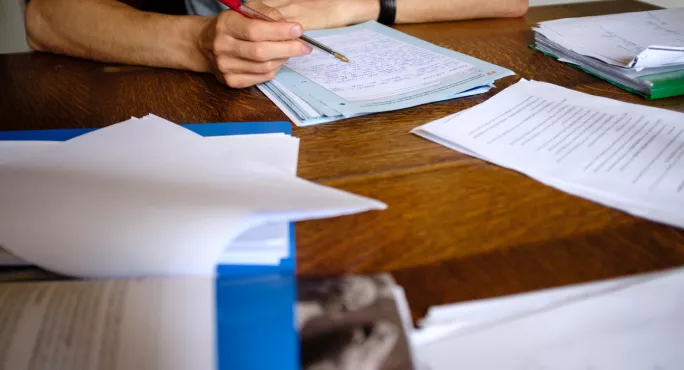GCSEs 2021: 4 tips for marking novices

As the Easter break begins, so does marking assessments and calculating grades. Even though we won’t be submitting our GCSE grades to AQA until 18 June, there is a metaphorical mountain to climb before then. Marking is bad enough if you are experienced; for those starting out during a pandemic, it probably feels like ascending Everest.
GCSEs 2021: Marking advice for new teachers
Ask for help
The number one tip is to always ask for help if you’re not sure about anything, even if it may seem like a silly question. You even may feel bad about disturbing a colleague during their marking, but the truth is we were all new to marking once, and most people will jump to share their experience with another. This is also a vital qualification for your learner’s progression, so it’s important to get it right. No pressure.
GCSEs 2021: 10 key points in new grading guidance
Need to know: Teachers can base grades on oral assessment
Ofqual assessment plans: What FE staff need to know
The importance of standardisation
Hopefully, wherever you teach, once your learners have completed assessments such as mock exams, your manager calls a team meeting to standardise some papers to ensure you are all marking at the correct and consistent level. This is a great time to check that you are using the mark scheme accurately as well.
Standardisation meetings are for everyone who marks for that qualification, so this is a great opportunity to ask any questions and get some second opinions if you’ve already marked a few papers. However, standardisation meetings can be intimidating, particularly if there are a lot of you, and some colleagues will have strong opinions… it can get a bit heated, and confusing. If you don’t feel you can voice your opinion or ask questions during the standardisation meeting, I would ask one of your colleagues if you could sit with them and do another mini standardisation meeting.
The marking process
Every subject is marked differently, but each assessment will have its own mark scheme. It’s really important to know how to use this. Listen during the standardisation meeting to see how your colleagues are using it. They will use specific language from the mark scheme to explain how they arrived at a mark.
For GCSE English language, I often start at the “clear” band and ask myself, “Is this answer clear?” Then I work my way up or down from there, and then use the descriptors to pinpoint the mark to award. If no one has walked you through the mark scheme or you’re still unsure, ask a colleague or your line manager. Your department might even have some training material on how to use it, or you could also check the exam board website to see if it has online training sessions or resources. Don’t forget that this counts towards your CPD (continual professional development) so do make a note of this somewhere.
Don’t rush
When you have a stack of marking next to you, it can feel very overwhelming and, for some, it will be very tempting to simply rush through it to get it done quicker. Unfortunately, with marking, especially when you first start, it can be quite a painstaking process - and that is totally normal. You must remember that, yes, you may have a deadline to meet, and yes, you want it to be over and done with, but at the end day, these are people’s futures you are playing a part in deciding.
Take your time, set yourself realistic marking targets (when I mark my GCSE English language papers, I set a timer for 20 minutes per paper). I also stick to the mantra of “little and often”. However, if you think you are falling behind or that you might miss the deadline, speak to your line manager. They might be able to help you with your marking or offer you an extension.
Kate Watts is a further education lecturer at a college in London
You need a Tes subscription to read this article
Subscribe now to read this article and get other subscriber-only content:
- Unlimited access to all Tes magazine content
- Exclusive subscriber-only stories
- Award-winning email newsletters
Already a subscriber? Log in
You need a subscription to read this article
Subscribe now to read this article and get other subscriber-only content, including:
- Unlimited access to all Tes magazine content
- Exclusive subscriber-only stories
- Award-winning email newsletters